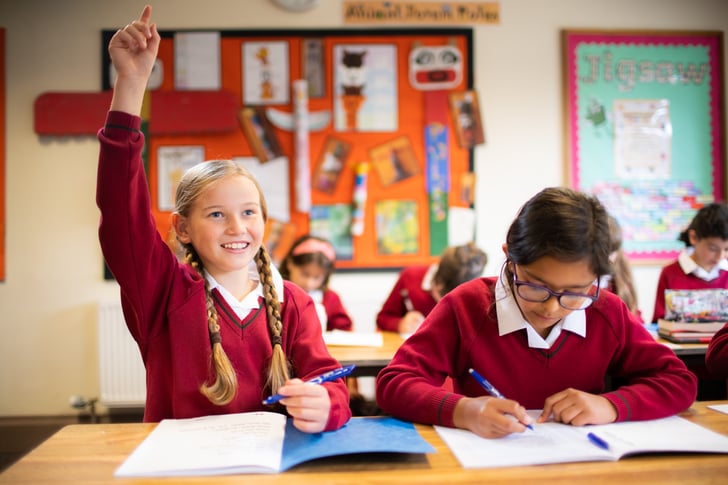Headteacher’s Blog: Why the junior years matter in girls’ education
Mixed ability maths - Fly on the wall account of maths at the Juniors

The maths lesson started with a recap of prior learning, converting improper fractions to integers, aka whole numbers.
“Touch your noses if you think you can do it; pat your heads if not!” Most fingers were on noses, but some hands were patting heads, too.
“Tell your neighbour what to do,” was the next instruction, as the girls burst into animated conversation with their table partners.
“I don’t quite get it,” one girl said.
“Don’t quite get it yet,” was Mrs Newton’s confident rejoinder from close by, where she was ensuring a head-patter was about to become a nose-toucher with some one-to-one support.
Mixed Ability Groups
Next, the buzz settled into a concentrated hum as the learning forged ahead. There’s a real emphasis on mixed ability teaching here. There is no streaming, and no-one is consigned to the ‘Red Table’ or put under pressure to keep up on the ‘Green Table’, in a setting environment within the classroom that children see through in an instant. It’s understood that all children may have green days and red days, times when they need some support or extra stretch. In every maths lesson, girls can choose between three levels of challenge as the lesson progresses, taking responsibility for their own learning and giving them a feeling of control.
What’s also important is that all girls are exposed to the higher level challenge. There are no ceilings. Everyone is taught to the top, before choosing the right level of challenge for themselves. It’s a style of learning which starts in Year 3 - by now, these Year 6 girls are more than capable of making the right choice.
Today’s mathematical strategies are varied. Initially, all girls are encouraged to visualise multiplication by drawing out the calculation, or keep it kinaesthetic using sticky blocks and parts of a circle. Most girls move on to multiplying the fraction by the integer. Some girls turn the integer into a fraction and multiply it out.
“Have a go! Over to you! You choose!” There is encouragement for all, and individual guidance for everyone as Mrs Newton constantly weaves between the girls, grouped around tables of between 4-6 in a friendly fashion. The atmosphere is purposeful and the organisation of the classroom, with individual desk drawers housing books and equipment, ensures efficiency.
Independent Mathematicians
Despite different challenges, one thing is common - jottings! Girls are expected to understand and apply a specific mathematical strategy in all the tasks they undertake. This approach consolidates learning and ensures that pupils truly think as mathematicians.
As Mrs Newton says: “You’ve done it in your head beautifully; but what did your head do?”
There is laughter. But the girls know that a lot is expected of them. Teaching is robust, and challenge is part of the pleasure in learning. Everyone is expected to be proactive: “Once you’ve had a go, I can come and help you. I need to see what you’ve tried to do.” Where one strategy hasn’t worked out, the teacher-pupil dialogue settles on another, and the calculation is begun again, this time with accurate results.
“Look how many I got wrong!”, exclaims one girl.
“But now you’re getting them right!” is Mrs Newton’s quick riposte.
Co-curricular Experiences
The girls' experiences of maths extend beyond the classroom. DoodleMaths is a personalised learning app that tracks individual progress and generates tasks accordingly. A ten-minute burst of daily Doodle time is strongly encouraged - not for homework, just for fun! With reward stars and leaderboards, its use encourages healthy competition amongst the girls. Maths Puzzle Club is a popular weekly feature on the lunchtime extra-curricular programme, and the school hosts the annual Bristol Maths Challenges for Y6 and Y4.
Over to You
Here's some recreational maths puzzles - just for fun.
Have a go - over to you - you choose!
THE FOX, THE HEN AND THE CORN
Once upon a time a farmer went to market and bought a fox, a hen and a sack of corn.
The farmer came to a river which needed to be crossed by boat. He could take only one of his purchases - the fox, or the hen, or the sack of corn - in the boat at a time.
If left together on the riverbank without the farmer, the fox would eat the hen, or the hen would eat the corn.
Can you find a way for the farmer to get all of them across the river safely? (Note - only the farmer can row the boat!)
Can you find more than one way of getting them across with the minimum number of crossings?
FAMILY TACTICS
Two adults and two children need to cross a river in a rowing boat. Can you determine how to get everyone across, and how many crossings are needed, given the following information?
- All adults weigh the same
- Each child weighs half as much as an adult
- The boat can only carry the weight of one adult
- Adults and children can row the boat
- The boat must have someone in it to row it!
What if there were 3 adults and 2 children?
What if there were 100 adults and 2 children?
What if there were n adults and 2 children?


-3.jpg?width=770&name=Untitled%20design%20(1)-3.jpg)
%20(1).png?width=770&name=Copy%20of%20Languages%20postcard%20version%202%20(620%20x%20620%20px)%20(1).png)

.jpeg?width=770&name=image00002%20(1).jpeg)




-2.jpg?width=770&name=Untitled%20design%20(3)-2.jpg)


.png?width=770&name=Untitled%20design%20(87).png)







-1.png?width=770&name=Untitled%20design%20(49)-1.png)